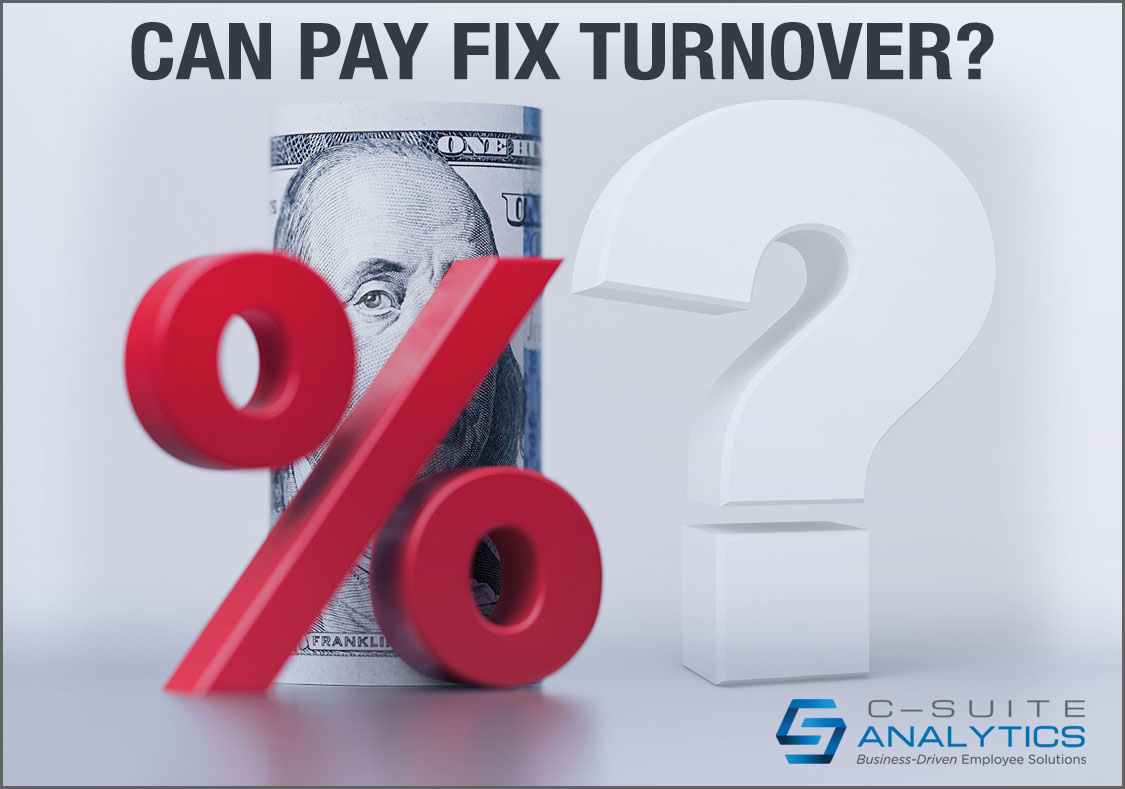According to the National Education Association, a full 600,000 teachers have already left teaching since January 2020, and a recent NEA poll indicated 55% more will quit prematurely. So, teachers are fast becoming a very talented recruiting pool.
How Much Can Pay Fix Turnover?

Quiz Question: Imagine you are the chief of police for the city of Pittsburgh…which is my hometown and this scenario was presented in the Pittsburgh Press newspaper last week. The city had 912 police officers at the beginning of this year, has just 836 now, and as one city councilperson said, “I’m just going to assume we’re going to lose the same number next year, which will put us at 725”. Then the public safety director added, “We’re going to have to come up with some solutions, some stop gaps to make sure we’re providing the services we usually provide”.[i]
So what do you predict the city of Pittsburgh will do?
A. Increase pay?
B. Increase recruiting?
C. Increase both pay & recruiting?
I’m willing to bet one mighty dollar with everyone who is reading this that the correct answer will be C, increase both pay and recruiting. Yet I doubt doing so will solve the city of Pittsburgh’s problem.
With recruiting, what new ideas might they have that they haven’t tried before? And recent data tells us a significant percentage of new hires across all industries don’t stay long.
So that leaves us with pay. When MIT issued its landmark paper on why employees are quitting during “The Great Resignation”, they said the top quit reason was “toxic corporate culture”. And that pay ranked…wait for it…16th as the main quit reason. The authors write, “Much of the media discussion about “The Great Resignation” has focused on employee dissatisfaction with wages. How frequently and positively employees mentioned compensation, however, ranks 16th among all topics in terms of predicting employee turnover. This result is consistent with a large body of evidence that pay has only a moderate impact on employee turnover.[ii]
I can’t tell you if pay is the 16th-ranked reason Pittsburgh police officers are quitting their jobs, but I’ll bet you another dollar that pay is not number one…nor in the top five.
You Can Cut Turnover by 20% or More, Even During “The Great Resignation”
Schedule a conversation with me at DFinnegan@C-SuiteAnalytics.com to discuss your employee retention roadblocks and I’ll share ideas for how you can move forward and what is working for other companies to cut turnover by 20% and more, even during “The Great Resignation” that may benefit you.
More Pay Is Like Suitcases Without Wheels
I don’t know how old one must be to remember trudging through airports carrying packed suitcases because suitcases then didn’t have wheels. Most of us though can remember telephone booths, putting aluminum foil on our TV antennas to get a clearer picture for the three stations we had on our black & white TVs, and…well, you get the point. Things change over time. But one thing that doesn’t change is the flawed belief that the top solution to employee turnover is more pay.
Why Pay Is The Popular Reason for Quitting
Pay is a popular quit reason because managers tell HR all the time that their best employee just quit because of pay. And getting back to the MIT study, wouldn’t you rather blame turnover on something as specific as pay rather than a turnover cause as amorphous and blame-producing as “toxic corporate culture”?
Exit interviews are another flawed practice that spotlights pay as major reason employees leave. Each year at the SHRM annual conference I ask audience members to raise their hands if their company conducts exit interviews and nearly all raise their hands. Then I ask them to leave their hands up if their company has improved retention based on the time and energy they invest in conducting exit interviews. Fewer than 5% have ever kept their arms in the air.
While some say exit interviews are autopsies, I’m certain they are only just toe-tags. Employees don’t tell the truth, reports are distributed with no follow-up actions, and if you google why employees leave, chances are great you’ll find the top answer to be “better opportunity” which tells you nothing.
Is Pay More About Money or Recognition?
Let’s agree that every employee has her price regarding leaving for more pay. Would I leave a non-exempt job for an additional $5 an hour? Maybe. Leave for an additional quarter an hour? Only if I hate my job. And the same is true for workers on every level…including executives, nurses, and even HR professionals.
But what, then, is the true value of let’s say a five percent raise? For non-exempt workers it doesn’t buy a new home, a new car, or hardly reduces the cost of the electric bill. But it does feel good to hear one’s manager tell you the performance-related reasons for the raise, to tell our families we got a raise, and to see it in our pay stubs…at least for a month or two. Or maybe a typical out-of-cycle raise just makes us feel less ripped off.
How Did The Pandemic Impact Turnover?
The missing piece here is that the pandemic changed everything. During 2020 over two million workers retired on the spot rather than cope with losing their jobs or working jobs that inconvenienced them once the pandemic hit. Another two million workers, mostly Moms, quit to stay home with their kids when schools and day cares were closed later that year. Then millions more applied for business licenses to become entrepreneurs while others chose to drive for Uber, dog-sit, or do other on-their-own jobs that didn’t require a license.
None of these quit reasons are about pay. But they are about rejecting corporate life…or “toxic corporate culture” as stated by MIT. American workers faced a one-year time-out period like never before, causing them to adjust to market conditions and also rethink their lives. The Wall Street Journal profiled a mid-forties healthcare worker who learned during the pandemic that his highest value was taking his girls to soccer practice. So he is now an entrepreneur. Good-by corporate America.
Companies that believe retention is based on pay, benefits, or any other traditional reason are dogs chasing their tails. They will never out-pay their competition for talent…but they will irritate and lose top performers by constantly raising starting pay without addressing pay compression for others.
What Should Pittsburgh Do?
Pittsburgh should do the same thing our clients do that consistently cut turnover by 20% and more. Drive employee retention through first-line supervisors versus “things” that have little marketplace value. Train their leaders to conduct Stay Interviews, and do so in the way I invented them back in 2012. Learn what matters most in their employees’ day-to-day work and fix it. Build trust by listening, taking notes, probing to get to deeper reasons, deeper meanings, so each employee feels they can trust their leader because their leader fixes what is most important. Or if during Stay Interviews managers learn that for example police officer safety is a main reason officers are quitting, develop and fund a plan to improve it.
Do you really believe a 5% raise will improve retention six months later? Raising pay is more about providing recognition than improving an employee’s living situation. The real reason employees stay…or leave…is whether their supervisor listens and solves day-to-day issues as best they can. Our company proves that every day with our clients.
[i] https://www.post-gazette.com/news/crime-courts/2022/12/01/pittsburgh-police-officer-shortage-recruitment-public-safety-budget/stories/202212010117
[ii] https://sloanreview.mit.edu/article/toxic-culture-is-driving-the-great-resignation/



